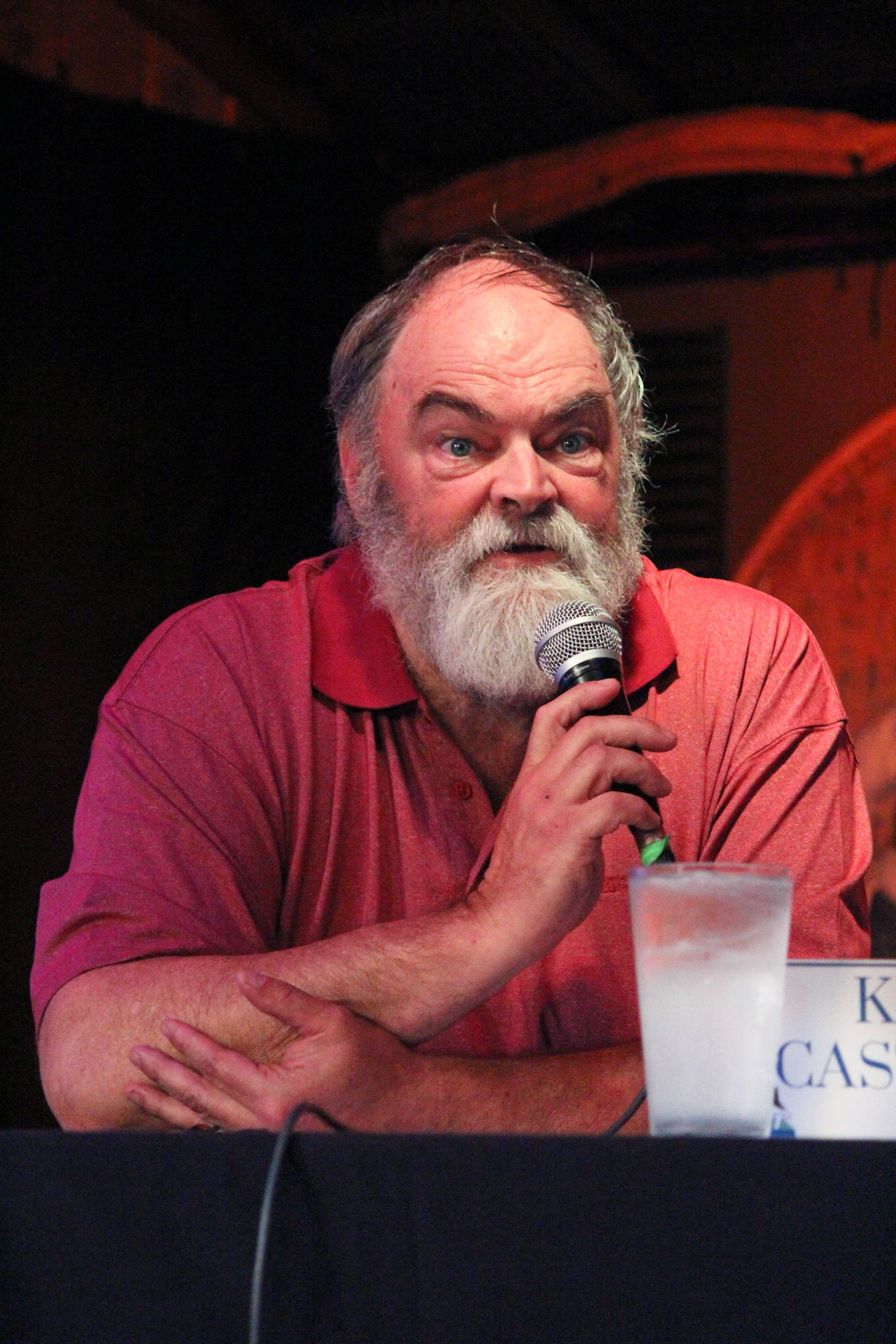Although Ken Castner has served on numerous city commissions, committees and task forces, his run for Homer Mayor marks the first time he’s actually been an official candidate for city office.
Castner, 66, said in an interview last Friday he’s running partly in response to a heightened national political climate and the animosity that has reached down to the local level.
His wife, writer and teacher Nancy Lord, told him he would make a good mayor.
“I thought about it five minutes and decided to run,” Castner said.
Born in Portland, Maine, Castner grew up on the north shore of Massachusetts in Topsfield, 30 miles north of Boston. After graduating from high school, he kicked around Africa a year before enrolling in the second class of Hampshire College, an experimental college started in 1970 in Amherst, Massachusetts. Lord and their friend, Homer writer Tom Kizzia, were in the first class of Hampshire.
Castner went to Hampshire for a year. He and Lord moved to Homer in 1973. They had wanted to be near the water and also considered Haines.
“Nancy wrote some letters and we got positive responses from Homer,” Castner said. “The most positive thing was ‘Come stay at my place; that will be OK’ from Yule Kilcher.”
He and Lord bought Quiet Sports, an outdoor recreation supply store, later constructing a log-cabin building next to the Hillas Building on Pioneer Avenue. They had it until 1978, selling to former legislator Gail Phillips.
Castner has worked as a commercial fisherman and a construction estimator, first for Tony Neal and later for Jay-Brant Construction. He now has his own business, Tonsina.
“I’m a numbers guy. I pore over plans and say ‘This is what it’s going to cost,’” he said.
That background led to numerous appointments to committees such as the several incarnations of the sewer and water rate committee, the Public Safety Building Review Committee and the Homer Public Library Building Committee.
“If you get into the public service thing we could be here all night,” Castner said. “…I’m involved in a lot of things that involve brain work behind the scenes.”
With Steve Yoshida, he helped start the Homer Foundation. That came about after the 1989 Exxon Valdez oil spill. Anticipating a windfall settlement, the thought had been fishermen and others might have funds they would want to put into a community foundation. Castner said they also wanted to set up a mechanism for institutional endowments like the Pratt Museum, “where people want to leave money in their will.”
Castner also has been a big booster of the annual Homer Nutcracker production, working as producer while the creative talent directs the show. His work on Nutcracker has shown him how people from disparate backgrounds can come together to make something amazing happen.
“When you have a common purpose, everyone cooperates,” Castner said. “…If you’re trying to keep to common purposes, everything goes. When you get to uncommon purposes — that’s when things fall apart.”
In running for mayor, Castner said he wants to be a citizen mayor, not a political mayor. He has three planks:
• “I will not break a tie. There’s not going to be any of this 4-3 stuff,” he said.
• “The mayor’s office is not going to write proclamations.”
• “The council shall establish public policy and the budget shall reflect public policy,” he said.
Castner has made not breaking a tie his main campaign point. Votes that split 3-3 lead to one faction rolling the other side.
“It’s not going to make anyone feel better,” Castner said. “The question I would ask about that is ‘What is the role of social engineering in government? There are people who want to engineer change in government action. Both sides react to that with the same visceral action. .. We’re feeding that with this system we have. I want to break that pattern of behavior.”
City code and Alaska Statutes support a mayor not being obligated to vote in the case of a tie, Castner said. The key word is “may.”
“Nobody’s ever tried this,” he said. “… What judge is going to say ‘may’ means ‘shall?’”
Castner said if elected mayor, it’s not that he won’t vote. If the council splits 3-3, he will announce to the clerk that the motion has failed.
Knowing that some votes will stall 3-3 will lead to the council seeking consensus, Castner said. City government is the lowest level of democracy, “the thing that’s closest to us, that affects us every day,” he said. “At this level we should be looking for consensus. I think we have six really smart people who can to do that. That’s their job.”
If elected, Castner said he would like to see more people involved.
“We can do more to involve the public in boards and commissions,” he said. “… We need to have some younger people take part. They need to be encouraged.”
Castner wants to see more of the unity that came with projects like the Homer Playground Project, where a group of mothers banded together, wrote grants, raised money and organized people to build a new playground at Karen Hornaday Park.
“I’m there for one purpose and one purpose only,” he said of how he wants to serve as mayor, “and that’s to mend fences. I’m not into driving wedges. I hope my message resonates.”


